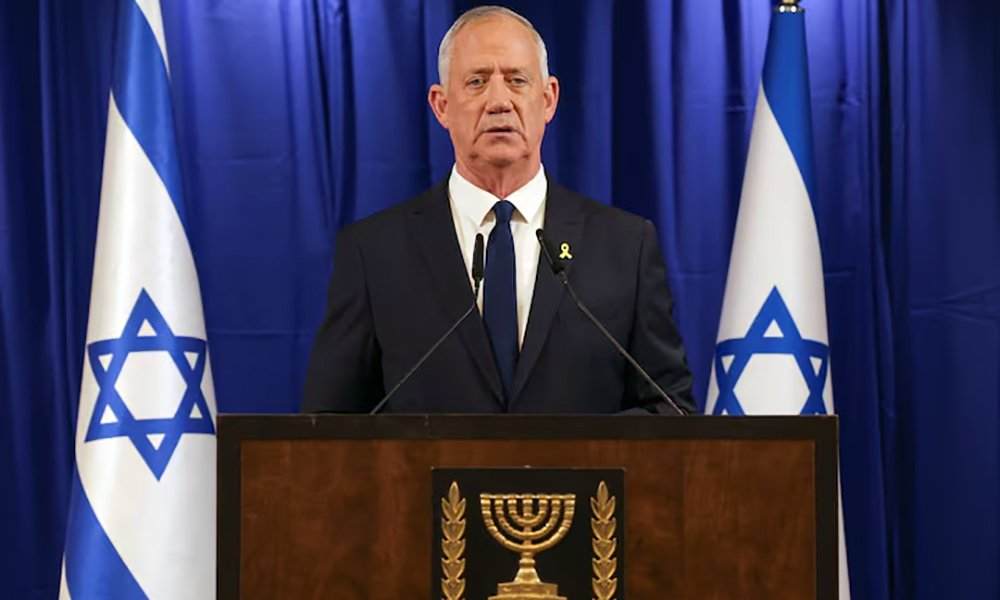Benny Gantz, Israel’s war cabinet minister, decided to step down eight months after the October 7 Hamas attacks, citing changes in the country’s situation and decision-making environment.

Benny Gantz, a key member of Israel’s war cabinet, has resigned from Benjamin Netanyahu’s government, dealing a significant setback to the prime minister amidst celebrations of a rare hostage rescue operation in Gaza.
In a televised address on Sunday, Gantz accused Netanyahu of obstructing a decisive victory in Gaza and described his resignation as a “complex and painful” decision. “Netanyahu prevents us from moving forward to a real victory [in Gaza],” Gantz said. “That is why we are leaving the emergency government today with a heavy heart, but with a whole heart.”
Also Read:- Emmanuel Macron Dissolves Parliament, Calls New Elections After Defeat to Le Pen’s Far-Right Party
Gantz, viewed as Netanyahu’s main political rival, decided to step down eight months after the October 7 Hamas attacks, citing changes in the country’s situation and decision-making environment. He accused Netanyahu of prioritizing personal political interests over a coherent post-war strategy for Gaza, leading to hesitant and delayed critical decisions. Gantz also urged Netanyahu to call for an election soon, stating, “Do not let our people be torn apart.”
The resignation fulfills an ultimatum Gantz issued last month, demanding Netanyahu to outline a new plan for the Gaza conflict by June 8. Gantz had intended to resign on Saturday but delayed the announcement following news of the Israeli forces rescuing four hostages in an operation that reportedly resulted in over 270 Palestinian casualties.
Despite Netanyahu’s plea for unity and urging Gantz to remain in the emergency government, Gantz announced his departure. “Benny, this is not the time to abandon the campaign – this is the time to join forces,” Netanyahu said in a post on X. He reassured the public of continued efforts until victory, emphasizing the release of hostages and the elimination of Hamas.
Netanyahu’s government remains stable as Gantz’s party was not part of his coalition, which retains a majority in the 120-member Knesset. However, Gantz’s exit leaves the war cabinet, established after the Hamas attacks, without representation from parties outside Netanyahu’s Likud. Defense Minister Yoav Gallant is now the sole other decision-maker in the emergency government. Following Gantz’s resignation, far-right National Security Minister Ben Gvir demanded to join the war cabinet.
Also Read:- Israeli Forces Rescue Four Hostages in Daring Daytime Raid in Gaza, Including Noa Argamani
The resignation coincides with growing pressure on Netanyahu from Western allies and hostage families to end the conflict and secure the release of captives. Despite eight months of warfare, Israel has yet to achieve its goals, with most Hamas leaders still at large and over 100 hostages held in Gaza. The United States has repeatedly urged Netanyahu to present a post-war plan for Gaza, with President Joe Biden suggesting that prolonging the conflict may benefit Netanyahu politically.
Gantz, a former defense minister, had previously called for a comprehensive plan including the elimination of Hamas, the return of hostages, establishment of an alternative government in Gaza, return of displaced Israelis, and progress on normalization with Saudi Arabia. Netanyahu rejected this ultimatum, arguing it would harm Israel.
Benny Gantz‘s popularity often surpasses Netanyahu’s, with a recent poll showing 42% support for Gantz compared to 34% for the prime minister. His departure reflects a strategic move to distance himself from the prolonged conflict and position himself as a responsible leader amid a government he views as filled with “inept and messianic misfits.”
Former Israeli diplomat Alon Pinkas suggested that Gantz joined the government to counterbalance the far right and prevent reckless decisions. However, as the war continued and with northern Israelis still displaced and hostages in captivity, Gantz likely recognized the potential loss of support if he remained. “The longer Gantz remains in the government, the weaker Gantz will get,” Pinkas noted.
